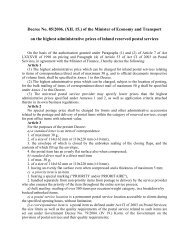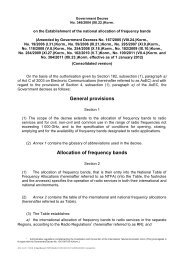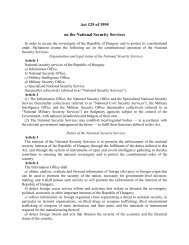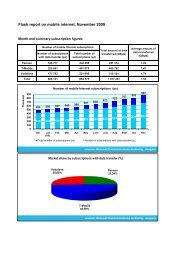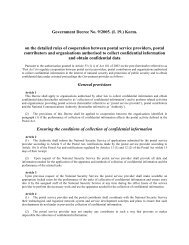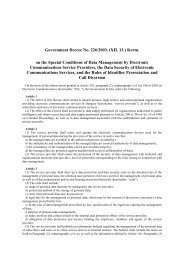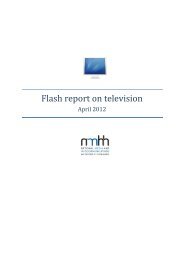The Hungarian Communications Market Developments and ...
The Hungarian Communications Market Developments and ...
The Hungarian Communications Market Developments and ...
You also want an ePaper? Increase the reach of your titles
YUMPU automatically turns print PDFs into web optimized ePapers that Google loves.
<strong>The</strong> <strong>Hungarian</strong> <strong>Communications</strong> <strong>Market</strong> <strong>Developments</strong> <strong>and</strong> Regulation between 2004 <strong>and</strong> 2008<br />
<strong>The</strong> most important reason for this was that MATÁV was obligated<br />
by the regulator (the legal predecessor of NHH) to provide broadb<strong>and</strong><br />
wholesale DSL service at the time of its launching.<br />
This obligation was a general obligation to provide access, with<br />
no specific provisions as to the conditions <strong>and</strong> prices of wholesale<br />
services. It was yet of great importance as the alternative service<br />
providers were not able to enter the DSL market without wholesale<br />
access, because the technology uses the same copper wire pair as<br />
fixed telephone services, since fixed incumbent service providers<br />
own these local loops which cannot be duplicated economically.<br />
Alternative service providers have fundamentally two options to<br />
develop their own services based on incumbent wholesale services:<br />
either through unbundled access to the local loop or using bitstream<br />
access. <strong>The</strong> two wholesale services, even if they represent different<br />
relevant markets, correlate with each another. Namely, alternative<br />
service providers have the option to decide which access they<br />
would like to use to enter the broadb<strong>and</strong> market. <strong>The</strong> business<br />
model based on the unbundled access to the local loop assumes<br />
significant investments <strong>and</strong> more extended networks on the part of<br />
alternative operators with more freedom for them in respect of both<br />
the specification of product characteristics <strong>and</strong> pricing. On the contrary,<br />
the business model based on the bitstream access, especially<br />
on IP-level access, allows alternative service providers to enter the<br />
market quickly <strong>and</strong> with lower investments, which, nevertheless,<br />
leaves less room to manoeuvre in terms of pricing <strong>and</strong> the specification<br />
of product characteristics.<br />
<strong>The</strong> two wholesale services may also be interpreted as two rungs<br />
of the so-called “investment ladder”. <strong>The</strong> first rung is the bitstream<br />
access, through which service providers can enter the market easily.<br />
<strong>The</strong>n, after stabilising their market position <strong>and</strong> establishing the<br />
necessary subscriber basis, they can step to a higher rung of the<br />
investment ladder, toward the business model based on the unbundled<br />
access to the local loop.<br />
Regulation of the unbundled access<br />
to the local loop<br />
Competition failures <strong>and</strong> the implemented regulation<br />
<strong>The</strong> regulation of the unbundled access to the local loop, the related<br />
competition problems, <strong>and</strong> the regulatory instruments applied show<br />
a close analogy with the interconnection (call origination <strong>and</strong> termination)<br />
markets.<br />
Similarly to interconnection markets, the refusal of the unbundled<br />
access to the local loop makes it difficult for alternative service<br />
providers to enter the retail market. <strong>The</strong>refore, in its decision of 2005,<br />
Figure 4.9: Prices of full unbundled <strong>and</strong> shared access to the<br />
local loop in reference offers accepted in 2002, 2004, 2006,<br />
<strong>and</strong> 2008<br />
HUF<br />
5000<br />
4000<br />
3000<br />
2002<br />
2004<br />
2006<br />
2008<br />
2000<br />
1000<br />
0<br />
Magyar Telekom<br />
full<br />
Magyar Telekom<br />
shared<br />
Emitel<br />
full<br />
Emitel<br />
shared<br />
Invitel<br />
full<br />
Invitel<br />
shared<br />
Hungarotel<br />
full<br />
Hungarotel<br />
shared<br />
Monortel<br />
full<br />
Monortel<br />
shared<br />
Source: NHH<br />
Remark: Emitel <strong>and</strong> Hungarotel are listed only for the purpose of comparison. Later on, Emitel<br />
has been incorporated into Magyar Telekom <strong>and</strong> Hungarotel into Invitel.



